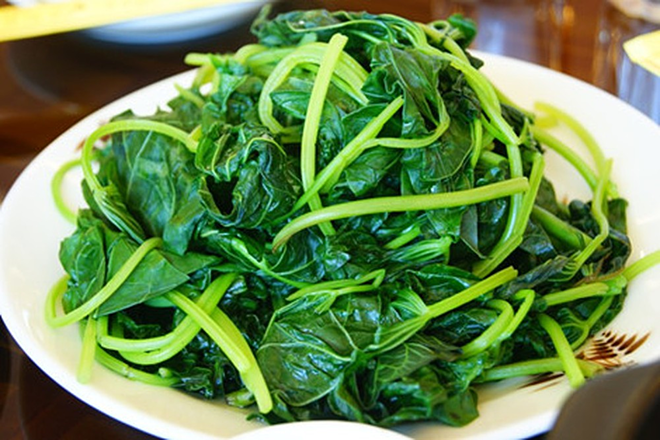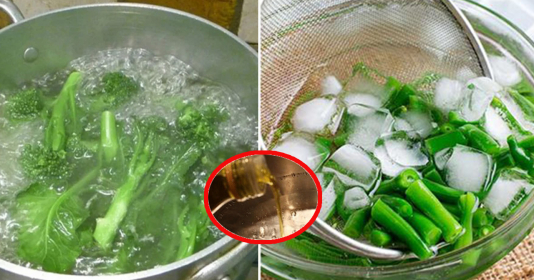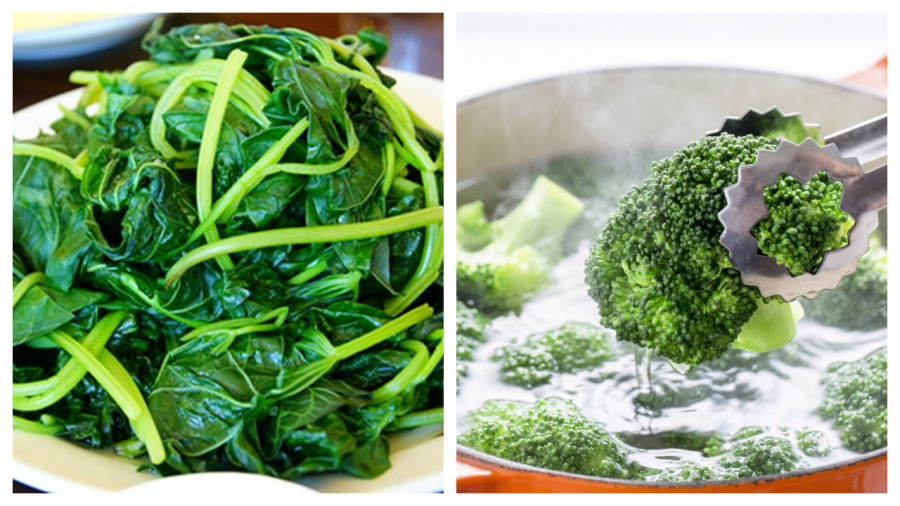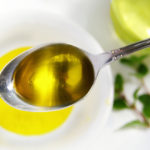Using salt and cold water when boiling green vegetables
One of the secrets to having vibrant and nutritious boiled vegetables that don’t turn dark is to add a bit of salt during the boiling process. Salt helps the dish retain its vibrant color and prevents it from tasting too bland.
In addition, when boiling green vegetables, you should add water to a pot and bring it to a boil over high heat. Once the water is boiling, add a small amount of salt to keep the vegetables green. The recommended ratio is 1/4 teaspoon of salt for every half liter of boiling water. Then, wait for the water to reach a rolling boil before adding the vegetables. Continue to boil the water for about 2-5 minutes, depending on the type of vegetables.

After 30 seconds, flip the vegetables and test for doneness. Once the vegetables are cooked, remove them and place them in a bowl of cold water with about 3-4 ice cubes. Allow them to cool for 2-3 minutes, then remove and drain. This method ensures that your green vegetables remain vibrant and attractive without turning dark.
Adding cooking oil to the boiling water
Many people think that only soups or stir-fried vegetables require cooking oil, but it’s not necessary when boiling. However, this is a misconception, as adding a small amount of cooking oil when boiling vegetables will keep them vibrant, tender, and retain heat for a longer time.
Furthermore, the cooking oil will make your green vegetables more appealing and enjoyable to eat.

Tips for delicious boiled green vegetables
Adding a little lemon juice or vinegar
For boiled green vegetables to retain their vibrant color and prevent them from turning dark, you can add a small amount of soup stock or vinegar. Both of these ingredients have acidity that neutralizes the chlorophyll in the green vegetables, ensuring that your boiled dish doesn’t turn dark and loses its aesthetic appeal.
Additionally, lemon juice or vinegar enhances the flavor of your boiled vegetables, making them more delicious and appealing to eat.

How to boil green vegetables
Note: Only add a small amount of lemon juice or vinegar to avoid making your boiled vegetables too sour and difficult to eat.
Oil and Safe Ways to Cook with It’>Tips on Selecting Healthy Cooking Oil and Safe Ways to Cook with It
A Taiwanese company has made a significant impact on the food industry through the recycling of over 700 tons of dirty oil, which has been exported to over 12 countries, including Vietnam. This has raised a few eyebrows among housewives, as cooking oil is an essential condiment in daily cooking. To ensure the safety and quality of their cooking oil, consumers should take note of the following advice.
Discovering Unusual Ways to Utilize Salt
Table salt: a staple for the kitchen table, and a surprisingly powerful and versatile tool for cleaning, preserving and more! From preventing the discoloration of vegetables to repelling termites to deodorizing shoes, the uses of salt extend far beyond the kitchen.







































